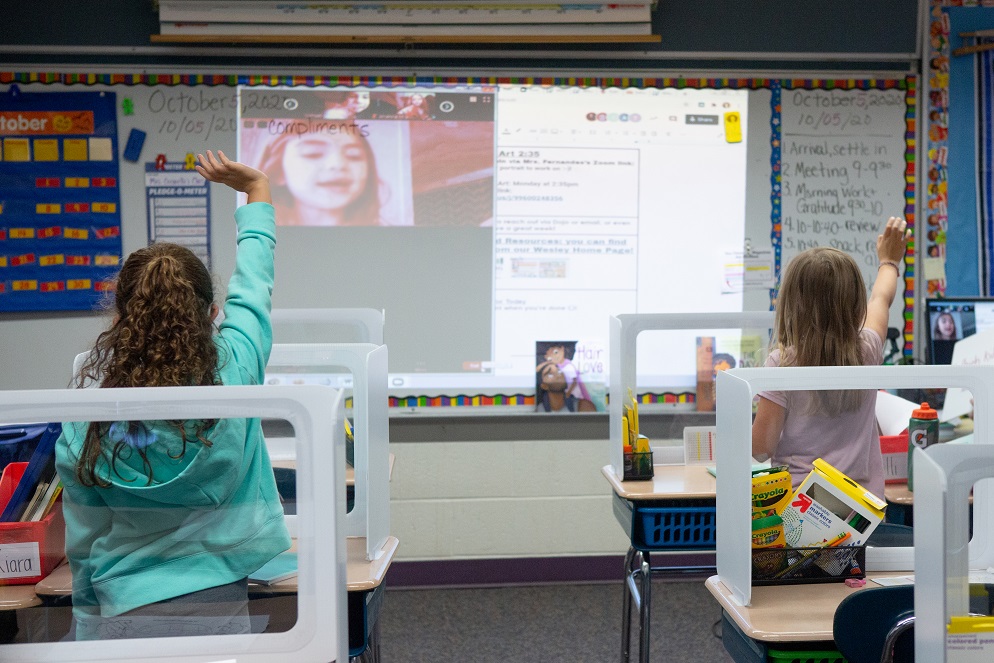The Importance of Post-COVID Teacher Professional Development
NMSI |
September 2, 2021
Educators have gone above and beyond during the pandemic. Teachers have had to quickly adapt to remote learning, deal with technical issues and keep students engaged during uncertain times. Although the public health threat is not over, especially for younger children unable to get vaccinated, some schools are returning to the classroom where teachers will continue to face challenges.
As teachers grapple COVID learning loss, the social-emotional health of students, a hybrid of remote and face-to-face learning, ramped-up safety precautions due to COVID-19, and residual burnout from the past school year, relevant professional development is more critical than ever before.

Why Post-COVID Professional Development Is Vital
Since the beginning of the pandemic, educators have had to assume a variety of new responsibilities. Whether it’s trying to teach remotely during a pandemic or navigating emotional stress, the scope of instruction continues to expand.
Technology
Although many teachers may now feel like pros, most had to learn how to maneuver remote teaching on the fly. So while teachers may be used to working with technology now, it can still be challenging, especially for those working with the most vulnerable students. Even when the pandemic subsides, several school districts report continuing to offer some form of remote learning.
Ongoing professional development can introduce teachers to more efficient tools, address pain points and make technology a welcome enhancement to instruction rather than another hurdle to overcome.
Student Mental Health Support
Even with heroic efforts by educators, the pandemic took a toll on many students’ mental health, with shutdowns and social isolation undermining many students’ mental and emotional well-being. As a result, educational researchers and experts have called for schools to address these emotional needs in the classroom directly. While this approach may be effective, it requires teachers to acquire additional skills obtained through professional development.
COVID Learning Loss
Although data continues to be gathered and the full impact is not yet known, researchers predict unequivocally that the pandemic has and will continue to contribute to significant learning loss. As a result, more than 20 percent of the ARP ESSER funds have been earmarked to combat learning loss.
Of particular concern is the learning loss of Black, Indigenous and youth of color. For example, a 2020 study found that students of color might be six to twelve months behind by the end of the academic year in June 2021, compared with four to eight months for White students.
Districts have the discretion to use funds to address learning loss and focus on students’ social and emotional needs—specifically Black, Indigenous and youth of color.
Research confirms that teacher quality is “the most influential factor in students’ educational outcomes.” Enabling teachers to provide remediation to address academic loss caused by the pandemic will require additional training and support.
Educator Self-Care
Educators’ social and emotional needs must also be part of any professional development since they are increasingly called on to provide initial support to students. They have also been impacted by the pandemic’s devastation, including dealing with stress, trauma and the loss of loved ones and colleagues to COVID-19.
Research has found that teachers who developed their social-emotional learning skills improved their well-being and their students’ social, emotional and academic development. Conversely, studies show that teachers required to teach SEL without being provided with professional opportunities to develop their SEL skills worsened the students’ skills.
The US Department of Education has confirmed that funds can and should be used to support educators’ social and emotional needs in the “Supporting Educator and Staff Stability and Well-Being.”
Professional Development and ARP ESSER Funds
Schools and districts must invest in their educators to ensure that the education system can fully recover from the impacts of the pandemic. The influx of federal relief funds—The American Rescue Plan Elementary and Secondary School Emergency Relief (ARP ESSER)—presents a unique opportunity to transform how educators are supported in their profession, not just during the recovery but also going forward.
Because professional development plays a crucial role in addressing learning loss and learning challenges, it falls under the 20 percent requirement. In addition, the funds may be used for various activities to address needs arising from the coronavirus pandemic.
The National Math and Science Initiative offers two programs: Laying the Foundation and the College Readiness Program, specifically addressing the academic needs and the disproportionate impact of COVID-19. In addition, embedded training for teachers to address social-emotional needs is available.
The influx of federal relief funds presents a unique opportunity to transform how educators are supported in their profession, not just during the recovery but also in the long term. Work with NMSI to develop a comprehensive plan to support teachers now and in the future with our NMSI 365 program.